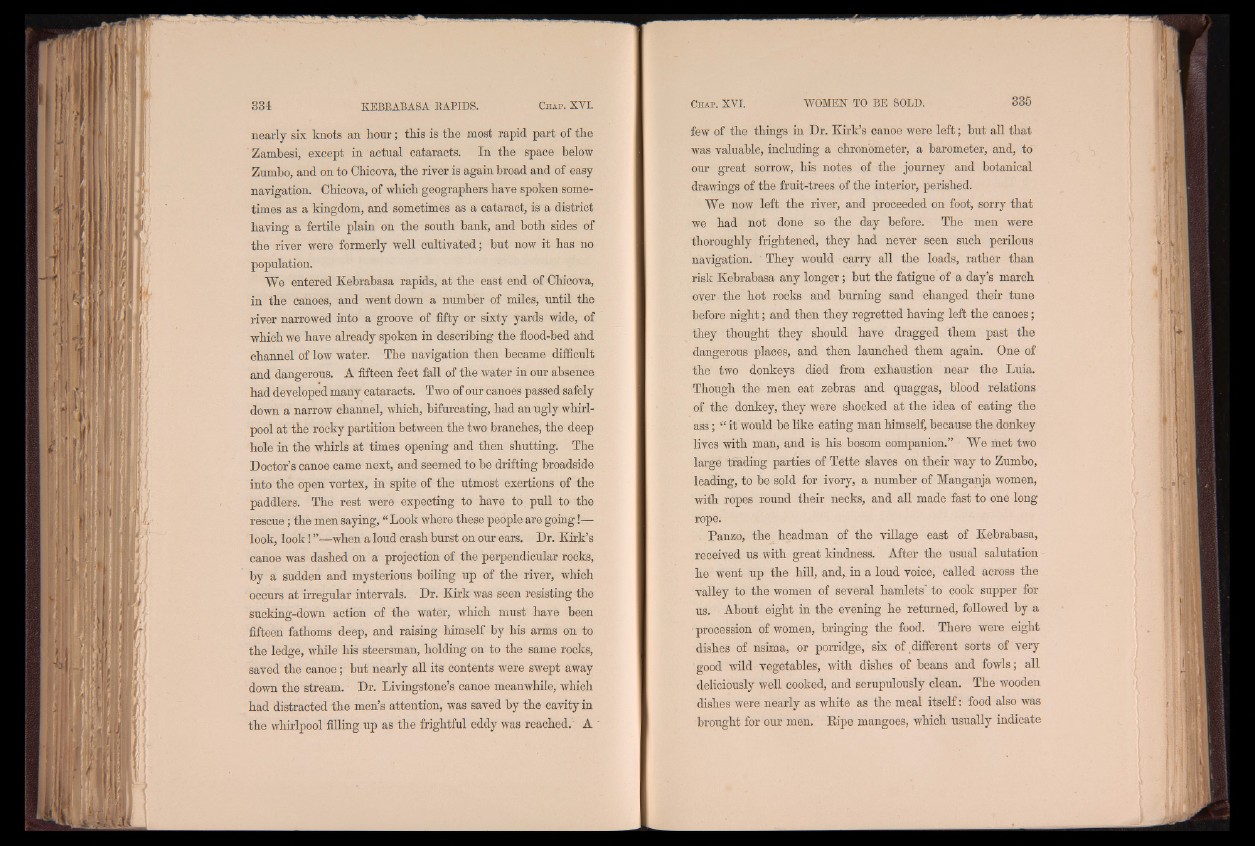
nearly six knots an to u r ; this is the most rapid part of the
Zambesi, except in actual cataracts. In the space helow
Zumbo, and on to Chicova, the river is again broad and of easy
navigation. Chicova, of which geographers have spoken sometimes
as a kingdom, and sometimes as a cataract, is a district
having a fertile plain on the south hank, and both sides of
the river were formerly well cultivated; hut now it has no
population.
We entered Kebrabasa rapids, at the east end of Chicova,
in the canoes, and went down a number of miles, until the
river narrowed into a groove of fifty or sixty yards wide, of
which we have already spoken in describing the flood-bed ahd
channel of low water. The navigation then became difficult
and dangerous. A fifteen feet fall of the water in our absence
had developed many cataracts. Two of our canoes passed safely
down a narrow channel, which, bifurcating, had an ugly whirlpool
at the rocky partition between the two branches, the deep
hole in the whirls at times opening and then shutting. The
Doctor’s canoe came next, and seemed to be drifting broadside
into the open vortex, in spite of the utmost exertions of the
paddlers. The rest were expecting to have to pull to the
rescue; the men saying, “Look where these people are going!—
look, look! ”—when a loud crash burst on our ears. Dr. Kirk’s
canoe was dashed on a projection of the perpendicular rocks,
by a sudden and mysterious boiling up of the river, which
occurs at irregular intervals. Dr. Kirk was seen resisting the
sucking-down action of the water, which must have been
fifteen fathoms deep, and raising himself by his arms on to
the ledge, while his steersman, holding on to the same rocks,
saved the canoe; but nearly all its contents were swept away
down the stream. Dr. Livingstone’s canoe meanwhile, which
had distracted the men’s attention, was saved by the cavity in
the whirlpool filling up as the frightful eddy was reached.' A
few of the things in Dr. Kirk’s canoe were left; but all that
was valuable, including a chronometer, a barometer, and, to
our great sorrow, his notes of the journey and botanical
drawings of the fruit-trees of the interior, perished.
We now left the river, and proceeded on foot, sorry that
we had not done so the day before. The men were
thoroughly frightened, they had never seen such perilous
navigation. They would carry all the loads, rather than
risk Kebrabasa any longer; but the fatigue of a day’s march
over the hot rocks and burning sand changed their tune
before night; and then they regretted having left the canoes;
they thought they should have dragged them past the
dangerous places, and then launched them again. One of
the two donkeys died from exhaustion near the Luia.
Though the men eat zebras and quaggas, blood relations
of the donkey, they were shocked at the idea of eating the
ass; “ it would be like eating man himself, because the donkey
lives with man, and is his bosom companion.” We met two
large trading parties of Tette slaves on their way to Zumbo,
leading, to be sold for ivory, a number of Manganja women,
with ropes round their necks, and all made fast to one long
rope.
Panzo, the headman of the village east of Kebrabasa,
received us with great kindness. After the usual salutation
he went up the hill, and,, in a loud voice, called across the
valley to the women of several hamlets' to cook supper for
us. About eight in the evening he returned, followed by a
procession of women, bringing the food. There were eight
dishes of nsima, or porridge, six of i different sorts of very
good wild vegetables, with dishes of beans and fowls; all
deliciously well cooked, and scrupulously clean. The wooden
dishes were nearly as white as the meal itself: food also was
brought for our men. Kipe mangoes, which usually indicate